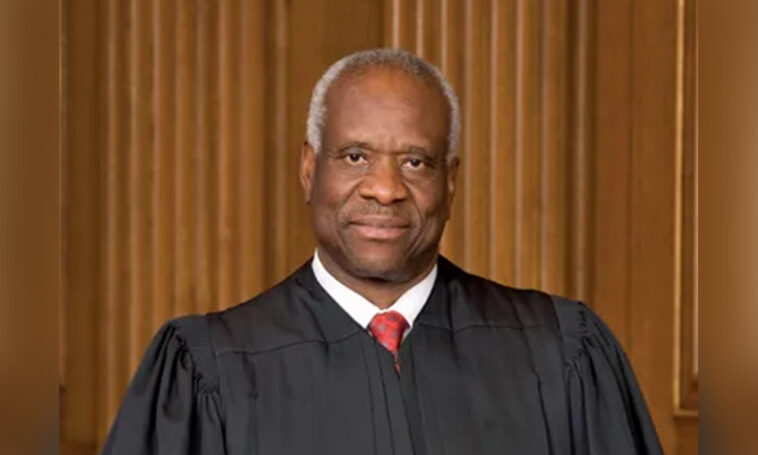A newly released Senate report has uncovered troubling details about the ethical conduct of U.S. Supreme Court Justice Clarence Thomas. The nearly two-year investigation, led by Democratic senators, revealed that Thomas accepted multiple luxury trips from Harlan Crow, a Texas real estate magnate and close family friend. These trips, which occurred in 2021, were not disclosed in Thomas’s financial records, raising serious questions about transparency and accountability within the U.S. Supreme Court.
According to the Senate Judiciary Committee’s 93-page report, Thomas traveled on a private jet from Nebraska to Saranac, New York, in July 2021, to stay at Crow’s private estate for five days. In October of the same year, Crow flew Thomas from Washington, D.C., to New Jersey for a statue dedication, where Thomas was also hosted overnight on Crow’s yacht in New York. The report describes these trips as among the most extravagant gifts ever accepted by a Supreme Court justice.
The investigation emphasizes that the scale of the gifts Thomas accepted is unparalleled in modern American history. The total value of these trips and other gifts Thomas has received from Crow and other wealthy benefactors is estimated to exceed $4.75 million. These revelations add to a long-standing pattern of ethical concerns surrounding Thomas, who has been criticized for accepting undisclosed gifts and travel for decades. While Thomas has previously argued that he did not need to disclose such gifts because Crow is a close family friend, the newly introduced Supreme Court ethics code, which came into effect in November 2023, explicitly requires such travel to be disclosed.
“The highest court in the land can’t have the lowest ethical standards.” — Senator Dick Durbin, Chairman of the Senate Judiciary Committee.
Under the new rules, justices are required to disclose gifts, travel, and other forms of financial support that exceed certain thresholds. However, the new code has faced significant criticism for lacking any enforcement mechanisms. The lack of clear consequences for violations means that justices, like Thomas, can continue to accept gifts without fear of penalty or disciplinary action.
Justice Thomas has defended his actions, claiming that he was unaware that these trips needed to be disclosed. He has also argued that Crow’s donations and gifts do not influence his judicial decisions. Crow has also maintained that he has never discussed any pending Supreme Court cases with Thomas. Despite these defenses, the Senate report raises concerns that such undisclosed gifts could undermine public trust in the impartiality and independence of the Court.

Thomas’s relationship with Crow and the undisclosed gifts are not new. The report traces this practice back to the tenure of late conservative Justice Antonin Scalia, who reportedly accepted similar undisclosed gifts. While some justices, including the late Justice Ruth Bader Ginsburg and retired Justice Stephen Breyer, also accepted subsidized trips, they reported them on their annual disclosure forms, which is in contrast to Thomas’s behavior.
The Senate report also highlighted that Thomas’s conduct is part of a broader issue concerning the lack of ethical oversight for the Supreme Court. The newly introduced ethics code, while a step toward reform, has been criticized for its lack of concrete enforcement measures. Without a binding mechanism to ensure compliance, many believe the code is ineffective in promoting accountability among the justices.
Public trust in the U.S. Supreme Court has been declining in recent years, and the latest revelations about Thomas’s ethical lapses are likely to further erode confidence in the Court. Advocates for reform have called for stronger enforcement of ethical standards and greater transparency in the Court’s activities.
Senator Dick Durbin, chairman of the Senate Judiciary Committee, stated, “The highest court in the land can’t have the lowest ethical standards.” His statement reflects the growing frustration among lawmakers and the public about the lack of meaningful reform in the Court’s ethics policies.
As calls for reform grow louder, the political landscape remains divided. With Republicans set to take control of the Senate in January, the prospects for meaningful action on Supreme Court ethics appear uncertain. The partisan nature of the issue complicates efforts to introduce stronger oversight mechanisms, especially given that the Supreme Court operates independently of Congress.
While the Senate investigation has shed light on Thomas’s questionable ethical behavior, it remains to be seen whether these revelations will lead to substantive reforms. For now, Thomas’s violations continue to raise serious concerns about the need for greater accountability and transparency within the U.S. Supreme Court.




Join the Community and Be a Part of the Conversation
You must be logged in or registered to post a comment.